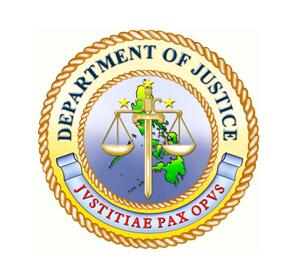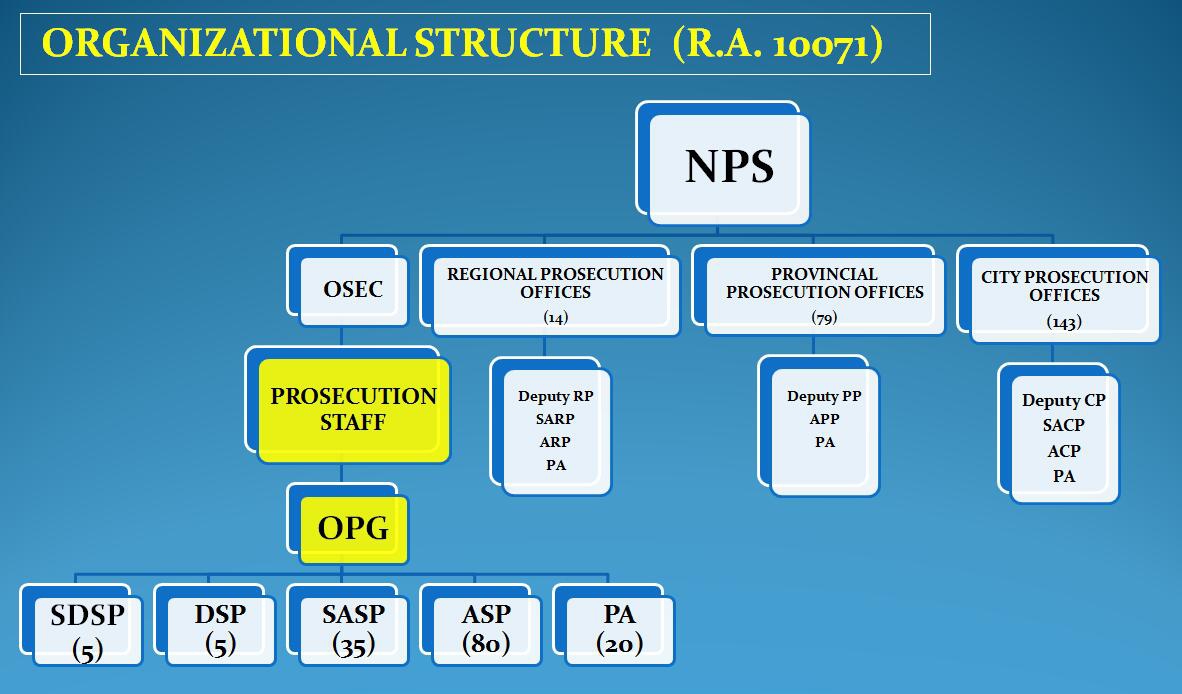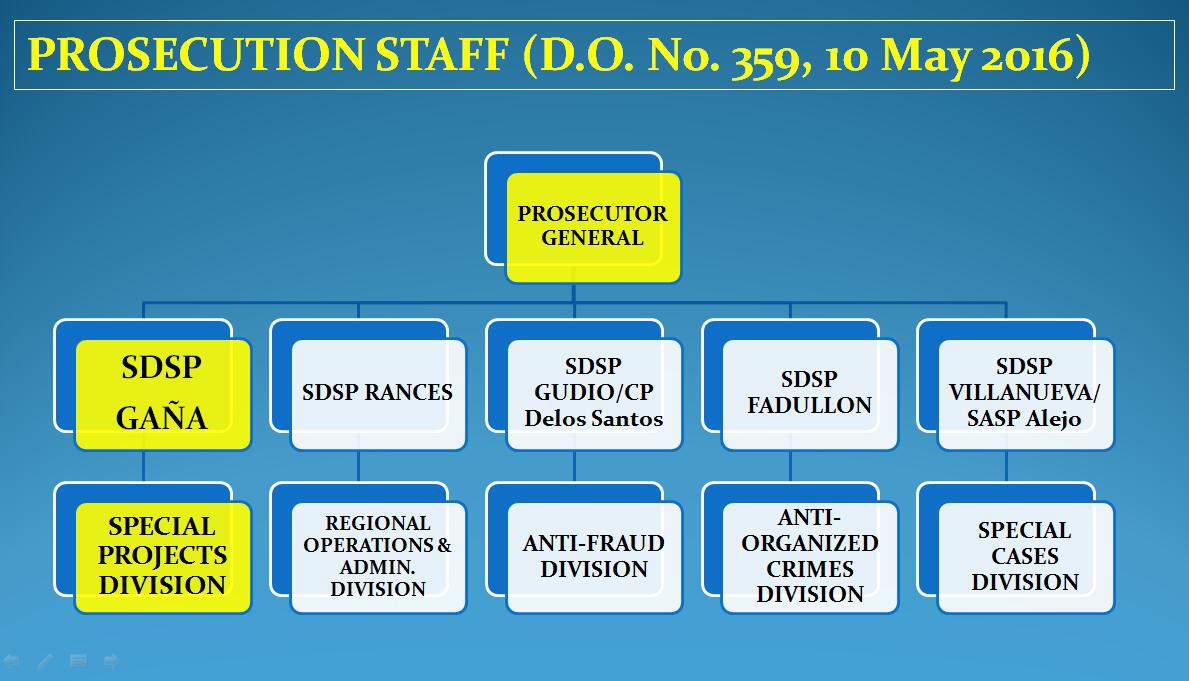I. National Prosecution Service
The history of the National Prosecution Service can be traced back during the Spanish regime through the Provisional Law on Criminal Procedure. During the 18th century in Spain, the sumario, a fact-finding inquiry carried out by the magistrate and his assistants to clarify the facts surrounding the commission of a crime. The proceedings took on an accusatorial nature with the rise of the practice of magistrates collecting evidence that incriminated the suspect and formed the basis of the prosecution’s arguments. In 1900, under the United States, in criminal cases, the justice of the peace exercised original jurisdiction for the trial of all misdemeanors and offenses committed within the municipality. Also empowered are the municipal presidents (now municipal mayors) to conduct preliminary investigations in the absence or inability of judges of the peace or their auxiliaries.
The first Rules of Court in the Philippines can be traced back to 1918 with the Supreme Court’s issuance of the Rules of Court of the Supreme Court of the Philippine Islands, the Courts of First Instance, and Rules for the Examination of Candidates for Admission to the Practice of Law. It was not until the promulgation of the Rules of Court in 1940 that the Rules on Criminal Procedure were included.
In the 1940 Rules, the authority to conduct preliminary investigations was extended to city fiscals, aside from the justices of the peace, municipal judges, judges of the Courts of First Instance, and in their absence, the municipal mayor.
Presidential Decree No. 1275 reorganized the prosecution staff of the Department of Justice and the officers of the provincial and city fiscals, regionalized the prosecution service and created the National Prosecution Service on April 11, 1978. A national office solely dedicated for prosecution was established, Called the National Prosecution Service (NPS) or NAPROSS, it was manned by more than 1500 state prosecutors, fiscals and special counsels with a support staff of approximately 6,000 personnel under the supervision and control of the Secretary of Justice, the Regional State Prosecution Offices and the Provincialand City Fiscal’s office. It was primarily responsible for the investigation and prosecution of all cases involving violations of penal laws.
The Secretary had the authority to act directly, modify or revoke any decision or action of the chief of staff. P.D. No. 1439 enacted on June 10, 1978 and P.D. No. 1513 on June 11, 1978 subsequently re-allocated the positions for provincial, regional and city fiscals.
The Administrative Code of 1987, also known as Executive Order No. 292, named the Department of Justice (DOJ) as the principal law agency of the government of the Republic of the Philippines.
Title II, Chapter I of the Administrative Code of 1987 mandated the Department of Justice as legal counsel and prosecution arm of the government to administer the criminal justice system. It provided for the Office of the Chief State Prosecutor to assist the Secretary in the performance of the powers and functions of the Department relative to its role as the prosecution arm of the government.
Presently mandated by Republic Act No. 10071 AN ACT STRENGTHENING AND RATIONALIZED THE NATIONAL PROSECUTION SERVICE, The Prosecution Staff, which shall be under the control and supervision of the Secretary of Justice, have the following functions:
(1) Assist the secretary of Justice in the exercise of his/her appellate jurisdiction;
(2) Conduct the preliminary investigation and prosecution of criminal cases involving national security, those for which task forces have been created and criminal cases whose venues are transferred to avoid miscarriage of justice, all when so directed by the Secretary of Justice as public interest may require;
(3) Act as counsel for the People of the Philippines in any case involving or arising from a criminal complaint investigated by any of its prosecutors and pending before any trial court;
(4) Investigate administrative charges against prosecutors, other prosecution officers and members of their support staff;
(5) Prepare legal opinions on queries involving violations of the Revised Penal Code and special penal laws; and
(6) Monitor all criminal cases filed with the Office of the Prosecutor General; maintain an updated record of the status of each case, and adopt such systems and procedures as will expedite the monitoring and disposition of cases.
The Prosecutor General and Senior Deputy State Prosecutors shall act as a Selection and Promotion Board to screen for appointment or promotion to any prosecutorial position in the Office of the Prosecutor General. The regional prosecutor, provincial prosecutor or city prosecutor shall sit as a member of the Board whenever it considers applicants for positions in his/her office. The Prosecutor General shall be the chairperson of the Board.
The law also provides that there shall be at each administrative region, except the National Capital Region (NCR), a Regional Prosecution Office to be headed by a Regional Prosecutor who shall be assisted by one (1) Deputy Regional Prosecutor, one (1) Senior Assistant Regional Prosecutor, three (3) Assistant Regional Prosecutors, and one (1) Prosecution Attorney.
For purposes of this regionalization, the NCR shall be placed under the administrative supervision of the Prosecutor General.
Powers and Functions of the Regional Prosecutor. - The Regional Prosecutor shall, under the control and supervision of the Secretary of Justice, have the following powers and functions:
(a) Implement policies, plans, programs, memoranda, orders, circulars and rules and regulations of the DOJ relative to the investigation and prosecution of criminal cases in his/her region;
(b) Exercise immediate administrative supervision over all provincial and city prosecutors and other prosecuting officers for provinces and cities comprised within his/her region;
(c) Prosecute any case arising within the region;
(d) When so delegated by the Secretary of Justice, resolve with finality appeals from or petitions for review of judgements and orders of provincial and city prosecutors and their assistants within the region in cases where the offenses charged are cognizable by the municipal trial court. This notwithstanding, the Secretary of Justice is not precluded from exercising his power or review over such resolutions of the regional Prosecutor in instances where lies grave abuse of discretion on the part of the Regional Prosecutor, and from determining the extent of the coverage of the power of review of the Regional Prosecutors;
(e) Designate a prosecutor from any office of the provincial or city prosecutor within the region as Acting Provincial or City Prosecutor to investigate and prosecute a case in instances where parties question the partiality or bias of a particular city or provincial prosecutor or where the city or provincial prosecutor voluntarily inhibits himself/herself by reason of relationship to any of the parties within the sixth (6th) civil degree of consanguinity or affinity;
(f) With respect to his/her regional office and the offices of the provincial and city prosecutors within his region, he/she shall:
(1) Appoint such number of subordinate officers and employees as may be necessary; and approve transfer of subordinate personnel within the jurisdiction of the regional office and exercise disciplinary actions over them in accordance with the Civil Service law, other existing laws and regulations;
(2) Approve requests for sick, vacation and maternity and other kinds of leaves, with or without pay, for a period not exceeding one (1) year, for overtime services; for permission to exercise their profession or to engage in business outside of office hours; for official travel within the region for periods not exceeding thirty (30) days; and for claims and benefits under existing laws;
(3) Exercise immediate administrative supervision over all provincial and city prosecutors, their assistants and all other prosecuting officers of the provinces and cities within his/her region;
(4) Investigate administrative complaints against prosecutors and other prosecuting officers within the region and submit his/her recommendation to the Secretary of Justice who shall, after review thereof and where warranted, submit the appropriate recommendation to the office of the president for the latter's consideration;
(5) Approve attendance of personnel in conferences, seminars and other training programs within the region;
(6) Prepare the budget for the region for approval of the Secretary of Justice and administer the same;
(7) Approve requisition for supplies, materials and equipment, as well as books, periodicals and the like and other items for the region in accordance with the approved supply procurement program;
(8) Negotiate and conclude contracts for services or for furnishing supplies, materials and equipment and the likes within the budgetary limits set for the region;
(9) Within his/her region, monitor the submission of all reports as may be required by the Secretary of Justice;
(10) Coordinate with the regional offices of other departments, bureaus and agencies of the government and with local governments units in the region; and
(11) perform such other duties and functions as may be Provided by law or as may further be delegated by the Secretary of Justice.
The Provincial Prosecutor or City Prosecutor. - There still be for each province or city a Provincial Prosecutor or city Prosecutor, as the case may be, who shall be assisted by at least one (1) Deputy Provincial Prosecutor or Deputy City Prosecutor and such number of assistant and associate prosecutors as provided for hereinafter. Provided, however, That whenever a new province or city is created, it shall have a provincial prosecutor or city prosecutor, a deputy provincial prosecutor or deputy city prosecutor and such number of assistant and associate prosecutors as there are court branches therein at the ratio of two (2) prosecutors for each branch of regional trial court, one (1) prosecutor for each branch of metropolitan trial court or municipal trial court in cities, and one (1) prosecutor for every two (2) municipal trial courts in municipalities or branches thereof municipal circuit trial courts.
Upon the establishment of the new province or city, position items of Prosecutor of the Office of the Provincial Prosecutor for the mother province in excess of the new equivalent pursuant to the ratio established above for the courts or branches thereof that remained to be served by the office shall be transferred automatically to the Office of the provincial Prosecutor or Office of the City Prosecutor for the new province or city, as the case may be: Provided, further, That when all or almost all of the regional trial court branches are seated at the city, the number of prosecutors for the city shall be proportional to the territorial jurisdiction covered by such branches of the courts.
In case a province is reverted to the mother province or a city is reconverted into a municipality for whatever reason, all the prosecution position items of the Office of the Provincial Prosecutor or Office of the City Prosecutor shall go to the Office of the Provincial Prosecutor for the mother province: Provided, however, That the position title provincial prosecutor or city prosecutor for the former province or city shall be changed to Assistant Provincial Prosecutor or Associate Prosecutor, as the case may be, and shall have the corresponding rank provided in Section 15.
When the exigencies of the service so require, a province or city may create positions for special counsels whose salaries and other emoluments shall come exclusively from local funds.
Powers and Functions of the Provincial Prosecutor or City Prosecutor. - The provincial prosecutor shall:
(a) Be the law officer of the province or city, as the case may be:
(b) Investigate and/or cause to be investigated all charges of crimes, misdemeanors and violations of penal laws and ordinances within their respective jurisdictions, and have the necessary information or complaint prepared or made and filed against the persons accused. In the conduct of such investigations he or any of his/her assistants shall receive the statements under oath or take oral evidence of witnesses, and for this purpose may by subpoena summon witnesses to appear and testify under oath before him/her, and the attendance or evidence of an absent or recalcitrant witness may be enforced by application to any trial court;
(c) Have charge of the prosecution of all crimes, misdemeanors and violations of city or municipal ordinances in the courts at the province or city and therein discharge all the duties incident to the institution of criminal actions, subject to the provisions of section 5 of the said law.
Under the Department of Justice, the National Prosecution Service is also identified by the logo below:

"JustitiaePax Opus"
The Department of Justice (DOJ) logo/seal features three stars representing the three main geographical islands of the Philippines; a scale symbolizing equality, which is balanced over a sword, symbolic of authority in the dispensation of justice. These symbols are superimposed over a map of the Philippines representing the country. The Latin maxim "JustitiaePax Opus", meaning "Justice for All", completes the logo and supports the rationale for DOJ's existence.
II. National Prosecution Service Philippines
The National Prosecution Service (NPS) assists the Secretary of Justice in the performance and functions of the Department as the prosecution arm of the government, particularly in the investigation and prosecution of all criminal cases, except those under the exclusive jurisdiction of the Ombudsman.
The NPS was created by virtue of Presidential Decree No. 1275 or the National Prosecution Law. The Prosecutor General (formerly called Chief State Prosecutor) assists the Secretary in the performance of powers and functions of the Department in implementing the provisions of laws, executive orders and rules, and carrying out the policies, plans, programs and projects of the Department on the investigation and prosecution of criminal cases, in the exercising supervision and control over the NPS.
The primary tasks of the National Prosecution Service are: To investigate and prosecute all criminal offenders under the Revised Penal Code and other special penal laws and to render opinions on queries from prosecutors regarding violations of the Revised Penal Code and other special penal laws.
Other than the Office of the Prosecutor General (OPG) in the Department of Justice Proper located in Manila, the NPS has 14 Regional Offices with around 200 constituent offices and 100 sub-offices for the 145 cities and 81 provinces nationwide.
The NPS is manned by 2,132 prosecution officers who are either prosecutors or prosecution attorneys and around 2,000 administrative supports staff. The local prosecution offices, in turn, are augmented by around 1,000 support staff provided by local government units (LGUs and other sources.
Pursuant to Department Order No. 359 dated 10 May 2016, the Office of the Prosecutor General was reorganized into four divisions, to wit:
1. Anti-Organized Crimes Division
Responsible for the conduct of inquest, preliminary investigation, and/or active prosecution, in cases falling under the Task Force on Terrorism and National Security, Task Force on Human Rights and Extra-Legal Killings, Task Force on Anti-Illegal Drugs, Task Force on Anti-Carnapping and National Task Force-Private Armed Groups.
2. Anti-Fraud Division
Responsible for the conduct of inquest, preliminary investigation, and/or active prosecution, in cases falling under the Task Force on Anti-Smuggling (RATS Cases), Task Force on Bureau of Internal Revenue Cases (RATE Cases), Task Force on Anti-Money Laundering Cases, Task Force on Intellectual Property Cases, Task Force on Security of Energy Facilities and Enforcement Energy Laws, Task Force on Securities and Business Scam, Task Force on Financial Fraud and BangkoSentral ng Pilipinas Cases and Task Force “TitulongManilis”
3. Special Cases Division
Responsible for the conduct of inquest, preliminary investigation, and/or active prosecution, in cases falling under the Task Force on Cybercrimes, Task Force on Environmental Cases, Task Force on Violence against Women and Children, Task Force on Anti-Illegal Recruitment, as well as those cases not falling under any of the Task Forces in Anti-Organized Crimes and Anti-Fraud Division as defined in their respective Department Orders.
4. Regional Operations / Administrative Division
This Division is responsible for the following:
• Review appeals from, or petitions for review of, resolutions of the Offices of the City Prosecutors in the National Capital Region in cases cognizable by Metropolitan Trial Courts, under Department Circular No 18 dated 18 June 2014, including all matters incident to review and appeal, as well as those other cases delegated to the Office of the Prosecutor General;
• Coordination with the Office of the Solicitor General (OSG) for the conduct of study and legal research and/or the preparation of appropriate action papers and/or pleadings in cases handled by the Department where appeals on any issue are taken to the higher courts either on certiorari or by way of special civic actions;
• Preparation and presentation of the budgetary requirements of the National Prosecution Service in coordination with the Financial and Management Service, this Department;
• Referral of cases to the appropriate division as herein set forth, in cases of inhibition of local prosecutors and/or transfer of preliminary investigation to the Office of the Prosecutor General; provided that such cases involving crimes that do not fall under any of the foregoing Divisions shall be referred to the Special Projects Division;
• Conduct of inventory of cases filed with the National Prosecution Office and the collation of reports from local prosecution offices;
• Coordination and monitoring of the activities of, and attend to the communications from, all Regional, Provincial and City Prosecution Offices throughout the country;
• Supervision and monitoring of the personnel and activities of the Docket Section and the Process Server Unit of the Office of the Prosecutor General;
• Investigation of administrative charges against prosecutors, other prosecution officers, and members of the support staff;
• Conduct of legal researches and formulation of legal opinions / advice on queries involving violations of the Revised Penal Code and other special penal laws;
• Attend to equipment and office supplies requirements of the prosecutors and support staff.
5. Special Projects Division
This division is responsible for the following:
• Development and management of projects that will be responsive to the requirements and challenges of the service, such as, but not limited to, career development and continuing legal education programs for prosecutors, and trainings, seminars and other capacity-building activities for NPS support staff;
• Coordination and liaising with other government agencies and/or private offices and development /project partners;
• Coordination and liaising with, and participation in, inter-agency councils/committees of which the Department or the NPS, is a member, and other important and sensitive departments, bureaus and agencies especially involved with criminal justice system, such as the following: Office of the President (OP), Department of the Interior and Local Government (DILG), National Law Enforcement Coordinating Council (NALECC), Inter-Agency Committee on Extra-Judicial Killings, Enforced Disappearance, Torture and Other Grave Violations of the Right to Life, Liberty and Security of Persons (IAC/AO 35, Justice Sector Coordinating Council (JSCC) and the like; and
• Act on all requests for official and personal attendance or participation of prosecutors and support staff of the NPS in meetings, conferences, seminars, lectures, or similar activities.
III. Organizational Structure

IV. Prosecution Staff

|

